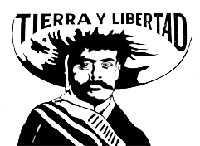|
"It is better to die on your feet than to live on your
knees."
Emiliano Zapata was one of several revolutionaries who in 1910
lead armies against Porfirio Díaz, the Mexican president
who ruled for 34 years becoming a virtual dictator. Díaz
had perused a policy of vigorous modernisation and largely ignored
the plight of rural peasants and indigenous people.
{top}
The son of a farmer, Zapata was born in 1879. He was elected the
head of is village in 1909 and raised an army which he lead into
the revolution. Unlike other leads of the revolutionary armies,
such as Pancho Villas, Zapata was not after personal gain and remained
committed to land reform.

Porfirio Díaz fled into exile in 1911 and was replaced by
Francisco Madero. Zapata continued his fight due to Madero's failure
to make any commitment to land reform. Madero did not last long
and was shot by conspirators in 1913 being replaced by Victoriano
Huerta. Huerta prevailed for an even shorter time and fled Mexico
in 1914 having failed to gain the support of any of the significant
forces within the country. Both Zapata and Villa fought on against
Venustiano Carranza who was declared president by his ally Alvaro
Obregón.
{top}
During the unrest that followed Zapata famously entered Mexico
City on horseback in 1914 and retained control there for most of
1915. Zapata continued fighting until he was shot in cold blood
on 10th April 1919, he had been lured to a meeting with one of Carranza's
generals who was feigning mutiny.
{top}
Zapata is remembered for his call for 'Tierra y Libertad' (land
and freedom) at a meeting on the future of Mexico in 1914 in Aquascalientes.
As well as calling themselves after Zapata, the Zapatistas have
adopted this slogan and call their five main meeting centres 'Aquascalientes'.
|
